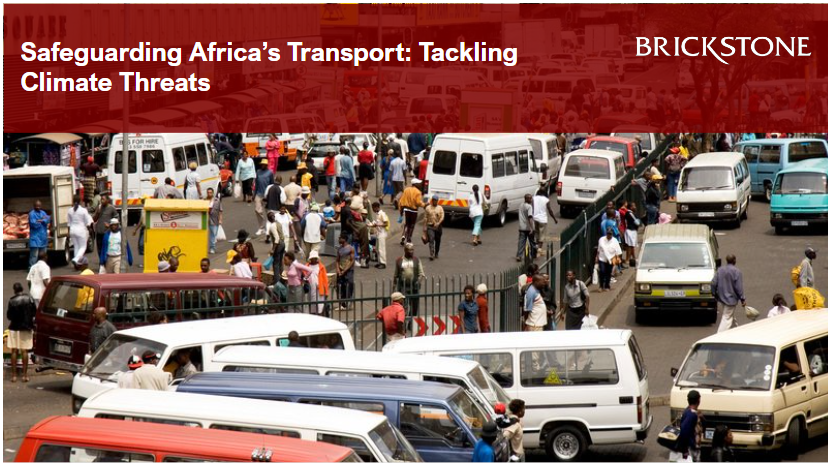Safeguarding Africa’s Transport: Tackling Climate Threats
Safeguarding Africa’s Transport: Tackling Climate Threats
The article Climate Change is a Threat to Africa’s Transport Systems: What Must Be Done delves into how Africa’s transportation infrastructure is increasingly vulnerable to the impacts of climate change. It highlights the risks posed by extreme weather events, such as floods, droughts, and rising temperatures, to the continent’s transport systems. The article argues that climate change is not just an environmental issue but also a critical factor affecting the development and economic sustainability of Africa’s transport infrastructure, which is vital for trade, movement of people, and access to essential services.
A central focus of the article is the lack of climate resilience in Africa’s existing transport infrastructure. Many African countries are already facing severe challenges in maintaining and expanding their transport systems due to insufficient funding, poor planning, and inadequate maintenance. Climate change is exacerbating these challenges, with extreme weather events leading to the destruction of roads, railways, ports, and airports. The article notes that floods are one of the most significant threats, often washing away roads and rail tracks, isolating communities, and disrupting supply chains. Rising temperatures also affect the durability of materials used in road construction, while sea-level rise threatens coastal ports and airports.
The article highlights specific examples to illustrate the vulnerability of Africa’s transport systems. For instance, in East Africa, flooding in recent years has caused significant damage to roads and railways, cutting off communities and disrupting trade routes. In Mozambique, Cyclone Idai caused massive destruction to transport infrastructure, hampering recovery efforts and highlighting the need for climate-resilient infrastructure. Similarly, countries like Ghana and Senegal are dealing with coastal erosion that threatens their ports, essential for international trade.
One of the article’s key insights is that without significant investment in climate-resilient infrastructure, African countries will continue to face high economic costs due to climate-related disruptions. The article estimates that by 2050, the costs of maintaining and repairing transport infrastructure in Africa could rise by as much as 20% due to climate change. These rising costs will strain already limited public budgets and hinder the continent’s economic growth. The article argues that proactive planning and investment in resilient infrastructure could mitigate these costs and ensure that Africa’s transport systems can withstand future climate shocks.
The article also stresses the importance of integrating climate resilience into transportation planning. This means that African governments need to prioritize the construction of infrastructure that can endure extreme weather conditions, such as flood-proof roads, bridges, and railways, as well as ports and airports designed to cope with rising sea levels. The use of climate-smart materials and technologies is also critical. For example, in some regions, switching to more heat-resistant materials for road construction can extend the lifespan of roads and reduce maintenance costs in the long term.
Furthermore, the article emphasizes the need for better coordination between African governments, regional organizations, and international donors. Given that Africa’s transportation network often spans multiple countries, cross-border cooperation is essential for developing resilient transport systems. The African Union’s Programme for Infrastructure Development in Africa (PIDA) is highlighted as an important initiative in this regard. However, the article suggests that more needs to be done to incorporate climate change adaptation into regional and national infrastructure projects, with a greater focus on securing funding for climate-resilient transport infrastructure.
Another important point raised in the article is the role of financing in building climate-resilient transport systems. The article notes that while international donors have been providing funding for transport projects in Africa, there is still a significant shortfall in the financing needed to address climate resilience. African countries are urged to leverage international climate finance mechanisms, such as the Green Climate Fund, to secure funding for transport projects that are designed to withstand the impacts of climate change. Additionally, private sector involvement is seen as crucial in mobilizing the necessary investments for large-scale infrastructure development.
A major takeaway from the article is the urgency of building resilience into Africa’s transport systems to ensure that they can support the continent’s long-term development goals. Climate change is already having a profound impact on the region, and without immediate action, the costs of inaction could be devastating, both economically and socially. The article calls for African governments to take a leadership role in driving the climate-resilience agenda, ensuring that future transport projects are designed with climate adaptation in mind.
In conclusion, Climate Change is a Threat to Africa’s Transport Systems: What Must Be Done provides a compelling argument for the need to prioritize climate-resilient infrastructure in Africa’s transport sector. The article highlights the risks posed by climate change to critical infrastructure and stresses the importance of forward-looking investment and planning. The piece is highly relevant to policymakers, infrastructure planners, and international development agencies, as it outlines the steps that must be taken to protect Africa’s transport systems from the worsening impacts of climate change. Addressing these challenges will require a coordinated effort between governments, the private sector, and international donors to ensure that Africa’s transport infrastructure can support sustainable development in the decades to come.
This article by Brickstone reviews the conversation’s publication on Urban Greening in Africa will help to build climate resilience–planners and government need to work with nature.
Read the complete publication here





